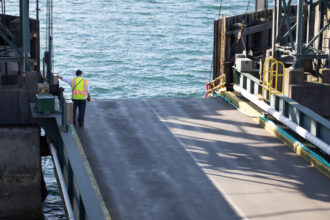 Menu Call Today504.838.8883 Close Back
Menu Call Today504.838.8883 Close Back- Home›
- About US›
- Workers’ Comp›
- Column1›
- Column 2›
- Work Injuries›
- Workers We Represent›
- How does workers’ compensation work?›
- FAQs›
- What to do if I’m hurt at work?›
- How to File a Workers’ Comp Claim›
- When should I hire a Louisiana workers’ compensation lawyer?›
- What will my workers’ comp benefits cover?›
- How long does it take to get workers’ comp benefits?›
- How much will my workers’ comp benefits pay?›
- Can I pick a workers’ comp doctor?›
- Can I collect Social Security disability benefits while receiving workers’ comp benefits?›
- Should I take a lump sum workers’ comp settlement?›
- Can I Change Jobs While on Workers’ Comp in Louisiana?›
- Longshore & Harbor›
- Social Security Disability›
- Areas We Serve›
- Blog›
- Contact›

4 Differences Between Longshore & Harbor Workers’ Comp and Jones Act Claims
Ports and waterways are some of the most important fixtures of our economy in Louisiana.
Working on or near water also comes with hazards.
If you’re a maritime worker injured on the job in Louisiana, you could get compensation through either the Longshore & Harbor Workers’ Compensation Act or the Jones Act.
Both are federal laws that offer maritime workers a stronger level of protection against financial damage from job injuries than other types of workers typically receive.
But they aren’t the same.
You could have a claim under one law or the other, probably not both.
This compensation can make a major difference in helping you move forward with your life the trauma of an injury on the job.
So which one is right for you?
How Longshore & Harbor and Jones Act Claims Are Different: 4 Ways
These are some of the major differences between these two types of financial assistance for workers who are injured on or around water.
Difference No. 1: The types of workers that qualify.
Longshore & Harbor workers’ compensation generally covers workers at ports, harbors, docks, dry docks, shipbuilding operations and shipbreaking facilities.
If your job involves constructing ships or loading and unloading them, and you’re hurt at work, you may be entitled to benefits under Longshore & Harbor workers’ comp.
This can include longshoremen, stevedores, construction workers and warehouse workers.
The Jones Act applies to people who spend a significant amount of their work time on vessels.
So if you’re a crew member, or what the Jones Act calls a “seaman” on a ship, and you get hurt working on the vessel, including when it is underway, you may have a Jones Act claim.
Difference No. 2: The type of legal claim you make.
Longshore & Harbor is a form of workers’ compensation. Jones Act claims are part of personal injury law.
That means the two types of remedies for injured workers fall under different areas of the law with different processes for making a claim, different points you have to prove, and different legal arguments you have to make.
When you’re looking to maximize your benefits under Longshore & Harbor, you’ll want to talk to a dedicated workers’ compensation lawyer.
But for Jones Act claims, you’ll need a lawyer experienced in personal injury.
Difference No 3: Whether negligence is involved.
A major difference between workers’ compensation claims (Longshore & Harbor) and personal injury claims (Jones Act) is whether negligence on the part of your employer plays a role in your claim.
Longshore & Harbor workers’ compensation doesn’t consider negligence. As with Louisiana workers’ comp for other types of workers, all that matters is that your injury happened on the job, not who was at fault.
The idea behind workers’ compensation is to provide fast benefits to injured employees while protecting employers from lawsuits over negligence.
Proving negligence, on the other hand, is central to a claim under the Jones Act.
Unsafe working conditions, poorly maintained vessels, faulty equipment, and inadequate training could all play into your Jones Act claim.
This is one reason why the two types of claims raise substantially different legal considerations.
Difference No. 4: The types of benefits and payments you receive.
Again, because of the differences between workers’ comp and personal injury, the compensation for you can take different forms depending on whether you have a Longshore or Jones Act case.
The primary benefits under Longshore & Harbor workers’ compensation are coverage for your medical care resulting from your injury and payment for 2/3rds of your missed income when you can’t work because of your injury.
A Jones Act claim can also pay for your medical costs and lost wages.
In addition to that, under the Jones Act, you can seek compensation for the pain, suffering, and mental anguish you’ve experienced thanks to your injury on the job.
Deciding on a dollar amount for pain and suffering is a function of personal injury law, not workers’ compensation law.
How to Get Help with your Longshore & Harbor Workers’ Compensation or Jones Act Case in Louisiana
A workers’ compensation attorney who handles Longshore & Harbor workers’ comp claims can help you navigate the system for getting benefits—and make sure you’re getting everything you’re entitled to receive.
Workers’ Compensation, LLC, is a Louisiana law firm for injured workers that have helped thousands of people in Metairie, New Orleans, Hammond, the Northshore, Baton Rouge, Houma, Lafayette, Alexandria, Shreveport, Monroe—and everywhere in the state.
If you were hurt at work as a crew member on a ship and need to pursue a Jones Act personal injury claim, the legal team at Workers’ Compensation, LLC, can also connect you with qualified representation.
The right kind of legal assistance after a workplace injury at a port or on ship can help you move beyond the trauma to better times.
I Want My Free Consultation

Serving Workers
CALL US »Metairie OFFICE
Hours:
Monday - Friday
8AM - 5PM






